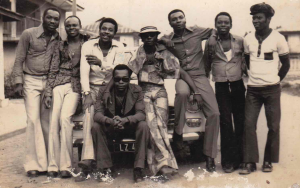
Of minds and choices
by Emanuele Biasiol | December 9, 2015
I was at the first monthly social of the Psychedelic Society of London, hoping to get in touch with Professor David Nutt or Dr Robin Carhartt-Harris, two new pioneers of psychedelic medicine collaborating on groundbreaking studies with the Beckley Foundation and Imperial College. They were examining the behaviour of neurones under the influence of LSD using MRI scanners, a technique happily oblivious to prohibitionist social mores.
Nutt had attended the Society’s launch event, so I was expecting an atmosphere of scientific rigour, unhindered by the flower-child free spirits with whom most of my discussions regarding psychedelics had taken place up to then.
But as I threaded my way through a crowd dotted with people who had clearly consumed psychedelics or stimulants immediately prior to the meeting, I struggled to ignore the feathery hats and ebullient discussions about the relative merits of different music festivals. To add to the sense of chaos, the floor above the conference hall happened to be hosting, at that precise moment, a particularly rowdy swing-dance class, filling the room with the happy stomps of the dancers above.
I spotted one other attendee with pupils as undilated as mine—a slight young man whose eyes were alert and perceptive, rather than half-closed and foggy. As he raised his voice above the clamour to ask me for directions to the gents’, I recognised him as the man who had introduced himself on stage as the Society’s President, Stephen Reid. I asked, with a hint of desperation, whether he could direct me in return to the scientists I’d come to hear. We were both disappointed—I didn’t know where the loos were, and Nutt and Carhartt-Harris had been too busy with their research to attend. Nevertheless, before disappearing back into the melee, he agreed to meet me later that month to give me the Society’s angle in a quieter setting.
Having graduated in Physics from Oxford in 2008, Reid went on to study Complexity Sciences at Bristol. Outside of academia, he has always been involved with campaigning for the causes he believes in, be it fighting austerity as a member of the New Economic Foundation and founder of the UK Uncut movement in 2010, or sustaining the environment as a board member of Greenpeace UK.
Despite his fiery conviction, Reid’s manner was gentle, open-minded, and friendly—he was happier than most to discuss his first experience with drugs, at Glastonbury in 2011, when he was offered an MDMA pill by a friend.
“I was new to drugs and I was so scared that I just pretended to take it, and hid it. About half an hour later, when I realized all my friends were having a really good time, I finally found the courage to join them. Let’s just say it was an interesting experience.”
It was the first of many positive experiences with psychoactive drugs that would eventually lead him to question the status quo on their prohibition. “I came to see the prohibition of psychedelics, and most drugs, as a gross infringement of human rights, and I wanted to change that.”
This sentiment was the genesis of The Psychedelic Society, which was born in November 2014 and spread quickly across the country, from London to Edinburgh, Manchester, Birmingham and Leeds, plus a sister organization in Ireland.
The Society is not short of ambition. Its long term goal is to ensure that people are not being punished for the choice of having psychedelic experiences through these substances.
The term “punished” is carefully chosen, and is broader than criminalization. “We want to stop families from disowning sons or bosses sacking employees because of the choice they made when using a substance on themselves. Psychedelics need to be seen as a legitimate choice.” To that end, the groups meet monthly in the hope of bringing together people that are interested in the subject, encouraging those who already use psychedelics to ‘come out of the closet’. Reid says the term is apt—“there is, indeed, a very interesting parallel with the LGBT fight for the recognition of their basic rights”. As Ethan Nadelmann, Executive Director of the Drug Policy Alliance, put it: “Nobody should be punished for what they put in their body, whether it’s a cock or a joint.”
The roots of the social stigma of psychedelics still lie, though, in their legal status. “Most people just know that they’re illegal,” Reid says, “and therefore they must be bad. For these people there’s no telling mushrooms from heroin. They like to keep the weirdness and hippie spirit they think emanates from the substances as far as possible.”
This fear seems to be the most stubborn obstacle to a rational debate: “Even if these so-feared psychedelic drugs were to be as potentially dangerous as the public perceives them to be (which, for the most part, is not true), if one choses to utilise them, not causing any damage to his peers, he should be free to do it. There’s plenty of activities which involve a much greater risk, such as extreme sports like sky diving or horse riding [riding alone caused 10 deaths and 100 serious incidents—including full paralysis—last year, whereas LSD caused none], but you don’t see the community turning on them like criminals or freaks, and banning the activity itself.”
Beyond just being not harmful, psychedelics can be useful. As well as recreational or spiritual, they can be medicine. “That’s always a wonderful thing to be able to communicate”, Reid tells me. “When you tell people that LSD is one of the few proven treatments for end-of-life anxiety or for most addictions, such as heroin, alcohol or tobacco, and that it managed to relieve loads of people from deep depression that resisted other forms of treatment, it gets people interested.”
For the most part, though, the scientific assessment of psychotropics is left to other organisations—“the Psychedelic Society comes in more from the human-rights angle.” But in the scientific community, too, drugs remain taboo. Sometimes, this is well-publicised—the sacking of Professor Nutt made headlines after the publication, in The Lancet, of his report explaining that LSD and MDMA are far less dangerous than alcohol and tobacco. Mostly, though, it goes unnoticed—it’s hard to say how many similar reports were suppressed, diluted, or defunded before they could see the light of day.
The final prong of the assault on drugs is the media. Scientific, political and social attitudes to these substances are fuelled by a hysterical, sensationalist press, for reasons that Reid says are clear—“a ‘Marijuana made my daughter jump from the balcony’ headline is more profitable than ‘LSD might cure end-of-life anxiety’”.
The Psychedelic Society’s aim is to break the cycle—but there’s still some way to go. Just two weeks after our encounter, a plan for a new law was leaked, banning the sale of “any substance intended for human consumption that is capable of producing a psychoactive effect”, except alcohol, nicotine and caffeine. Defying public opinion (in a recent poll conducted by the Sun, 71% agreed that the “War On Drugs” had failed), legal precedent, and common sense, politicians have once again let their terror of punishment at the ballot box obscure their judgement—and, in many cases, their personal views.
Not only was David Cameron nearly expelled from Eton for smoking cannabis, he has also refused to deny taking cocaine. One might assume this hypocrisy to be a common side-effect of a Tory ambition, but Cameron’s intellectual about-turn goes even further: he was one of the first to defy his party’s views on psychoactive substances, as early as 2002, when he publicly denounced the failures of the prohibitionist approach, and again in 2005, when he ran for Tory leadership with an unusual but surprisingly informed critique of the current drug policy and its focus on useless reactionary crackdowns.
It is thus even more disheartening to see what sort of conservative parrot he has turned into a decade later, thoughtlessly repeating the same empty words as statistics show that the present drug policy remains dreadfully ineffective, his government blindly refusing to even discuss the regulation of light psychotropics such as cannabis.
Perhaps he might feel differently about the government’s policy if, rather than receiving a gentle telling-off from an Eton housemaster, he had been in the shoes of one of the disproportionately disadvantaged, disproportionately black young people who routinely have their lives wrecked by the irrational laws, which, he mechanically repeats, are “working”.
Image by Jose Maria Cuellar




